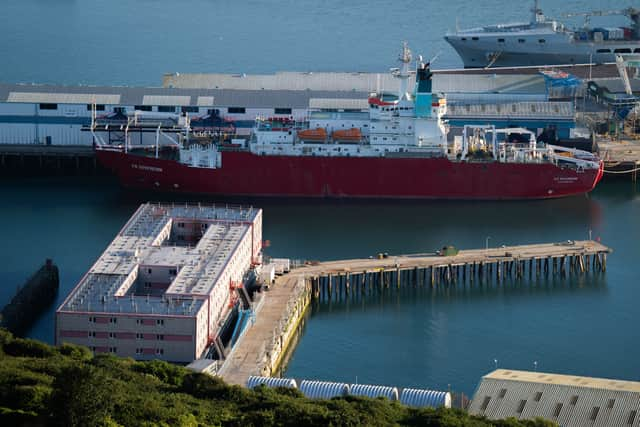Bibby Stockholm: asylum seekers to return to Dorset barge after Legionella scare, Home Office says
and live on Freeview channel 276
The Home Office has told asylum seekers that they will soon be returned to the Bibby Stockholm barge.
Thirty-nine migrants were moved on to the floating vessel in Portland Port, Dorset on 7 August, but were evacuated just days later after it emerged that tests on the water supply had detected traces of Legionella - a bacteria which can cause a serious type of pneumonia.
Advertisement
Hide AdAdvertisement
Hide AdIn a statement, the Home Office said that “all necessary tests” had been conducted on the Bibby Stockholm - and that letters had been sent out to asylum seekers “reiterating that accommodation continues to be offered on a no-choice basis”. It is understood that no date has been given yet for the re-embarkation.
A government spokesperson said: “The Home Office has started to send letters to asylum seekers to confirm the re-embarkation of the Bibby Stockholm and notify them that they will be accommodated on board, following the vessel completing all necessary tests. The letters confirm the next steps and reiterate that all accommodation continues to be offered on a no-choice basis.
“Delivering alternative accommodation sites, such as the vessel, is more affordable for taxpayers and more manageable for communities, due to healthcare and catering facilities on site, 24/7 security and the purpose-built safe accommodation they provide.”
According to a recent report in iNews, the Bibby Stockholm has cost the Home Office almost £300,000 per week while it has been empty.
Advertisement
Hide AdAdvertisement
Hide Ad

The update about the barge comes on the same day a resident from Dorset is set to ask the High Court for permission to launch a legal challenge against the Home Office over its use of the barge.
Carralyn Parkes - who lives on the Isle of Portland, where the Bibby Stockholm is docked - is set to argue that the vessel is essentially a permanent structure, and so the government requires planning permission for it. Ms Parkes is the mayor of Portland, but intends to bring the challenge in a personal capacity.
The Bibby Stockholm has been mired by controversy ever since it was first announced. The initial move date for migrants was heavily delayed by safety concerns, local opposition, and legal challenges, and around 20 people initially expected to board the barge were granted a last-minute reprieve following interventions by lawyers.
Charities, experts, and campaigners also frequently spoke out against the use of the vessel, with a spokesperson for Refugee Council telling NationalWorld in August: “We have a responsibility to give people seeking asylum safe and secure accommodation while they are in the UK asylum system.
Advertisement
Hide AdAdvertisement
Hide Ad“However, instead of providing people who have come to our country in search of safety with suitable places to live, the government is placing them in accommodation that is entirely unsuitable to their needs.”
The Fire Brigades Union also slated the Home Office over the barge, with general secretary Ben Selby claiming that he had tried to warn Home Secretary Suella Braverman about the health and safety risks prior to the asylum seekers being boarded - but that she had never responded to his request for a meeting.
His statement read: “The Fire Brigades Union warned the Home Secretary that forcibly holding migrants on this barge was a huge health and safety risk.
“We wrote to Suella Braverman... to demand a meeting to discuss these issues. We have had no response that letter, and our fire safety and operational safety concerns remain. It remains our professional view that it’s a potential death trap and an accident waiting to happen. However, Suella Braverman and her ministerial colleagues are hellbent on confining vulnerable people in jail like conditions on what is effectively a prison ship.”
Advertisement
Hide AdAdvertisement
Hide Ad

Meanwhile, after their evacuation from the barge, the group of 39 asylum seekers briefly housed there wrote an open letter to Home Secretary Braverman in which they claimed the conditions were so terrible that one attempted to commit suicide.
They described the barge as “terrifying”, “unsafe”, and “a place of exile” - adding that being onboard made them feel like “criminals” and “second class citizens”.
The Home Office has maintained that “the health and welfare of individuals on the [Bibby Stockholm] is [their] utmost priority.”
In a statement on its website, the government has explained its use of the barge, writing: “The pressure on the asylum system from small boat arrivals has continued to grow and requires us to look at a range of accommodation options which are more appropriate and offer better value for the taxpayer than expensive hotels.
Advertisement
Hide AdAdvertisement
Hide Ad“The increase in crossings means that around 51,000 destitute migrants are currently being accommodated in hotels - costing the taxpayer in excess of £8 million per day.
“This is why we will be using alternative accommodation options, such as barges, which are cheaper and more manageable for communities, as our neighbours in Europe are also doing.”
Comment Guidelines
National World encourages reader discussion on our stories. User feedback, insights and back-and-forth exchanges add a rich layer of context to reporting. Please review our Community Guidelines before commenting.
